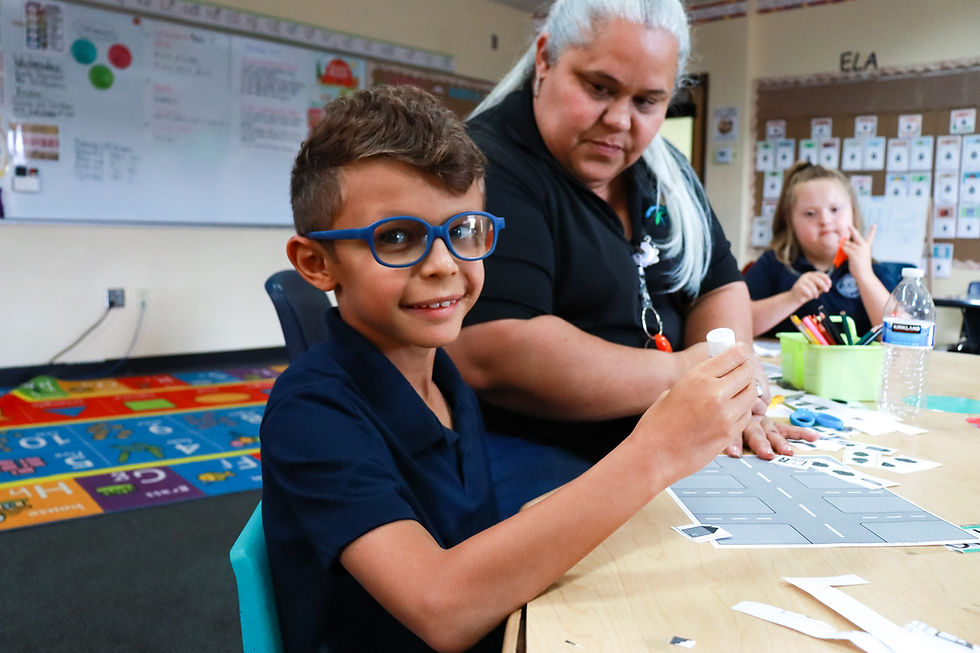Summer Play – Kindergarten through 2nd grade
- UCP OF CENTRAL FLORIDA

- Jul 9, 2025
- 3 min read
Updated: Aug 27, 2025
Written By: Anna O'Connor Morin, Senior Director of Education

Play-based games are a fantastic way to support your child's education during the summer break. These games make learning fun and engaging, helping children practice important skills without feeling like they are in a classroom. For example, games like "Go Fish" can teach children to recognize numbers, match them, and even compare quantities, all while having fun. Board games and cooperative activities also encourage social skills like taking turns, sharing, and teamwork.
Through play, children stay motivated to learn and explore, which is especially important during the summer when they are away from school. Whether it's counting stars in the sky, sorting objects by color or size, or playing hide-and-seek, these activities help children develop math, literacy, and problem-solving skills in a relaxed and enjoyable way. Parents can also use these opportunities to bond with their children and create lasting memories, making summer learning a joyful experience for the whole family.
Here is a list of parent-friendly educational play ideas for Kindergarten through 2nd grade, designed to be simple, engaging, and easy to implement at home.
Math Activities
Counting and Sorting Everyday Items: Use blocks, toys, or snacks to count and sort by color or size. This helps children learn early math skills in a fun way.
Grocery Store Shape Hunt: Explore different shapes during your next grocery store trip. For example, look for circles (cans), rectangles (boxes), and triangles (signs).
Laundry Sorting Game: Sort laundry by color or match socks together. This activity reinforces sorting and matching skills.
Number Plate Game: Write numbers 1-10 on small paper plates. Have your child count and place small items (e.g., three blocks on the number 3 plate).
Language and Literacy Activities
Cozy Reading Spot: Set up a comfortable reading area and read books together. Encourage your child to point to pictures, repeat simple words, or help turn the pages. This builds vocabulary and listening skills. Storytelling with Props: Provide materials like toy phones, crayons, and paper.
Encourage your child to create stories or write notes, which enhances creativity and language skills.
Rhyming Games: Play games where you and your child take turns saying words that rhyme. This builds phonological awareness.
Science and Exploration
Sink or Float Experiment: Fill a small tub with water and gather objects like spoons, toys, or sponges. Predict whether each item will sink or float, then test it. This teaches observation and prediction skills.
Nature Walk with Magnifying Glass: Take a walk outside and use a magnifying glass to examine leaves, bugs, or rocks. Discuss what you see to encourage curiosity.
Star Counting: Sit outside at night and count the stars together. This activity combines relaxation with early math skills. Creative Play
Pretend Play with Household Items: Use objects like empty paper towel tubes as telescopes or plastic spoons as drumsticks. Encourage your child to use their imagination.
Cookie Decorating with Numbers: Make cookies in the shape of numbers and decorate them with the corresponding number of chocolate chips. This combines creativity with math.
Pattern Creation: Use buttons, blocks, or coins to create patterns. Ask your child to replicate or extend the pattern.
Social and Emotional Development
Neighborhood Walk and Talk: Walk around your neighborhood and point out places like the grocery store or fire station. Talk about what happens in each place and the people who work there.
Board Games with Family: Play simple board games that involve taking turns and following rules. Focus on the fun rather than winning.
Friendship Stories: Read books about friends and discuss lessons like sharing, being kind, and helping others.
Physical Development
Animal Movement Game: Pretend to be different animals. For example, hop like a bunny or stomp like an elephant. This helps develop coordination and strength.
Outdoor Splash Pad Counting: Visit a community park with splash pads and count the spaces where water comes out. This combines physical activity with counting.
Obstacle Course: Create a simple obstacle course in your yard or living room using pillows, chairs, and toys. Encourage your child to crawl, jump, and climb through it.
These activities are designed to be fun, educational, and easy for parents to do with their children at home. They cover a range of skills, including math, literacy, science, creativity, and social-emotional development.




Comments